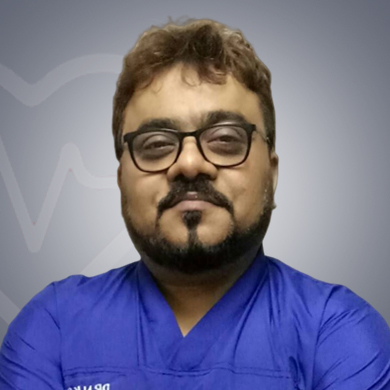
Laparoscopic & Bariatric Surgeon
Fortis Hospital , Kolkata, India18 Years of experience
Speaks: English
Here is a list of some of the conditions the General Laparoscopic Surgeon Naba Kumar Saha treats:
The General Laparoscopic Surgeon uses “minimally invasive” surgery to treat various digestive conditions. Most intestinal surgeries are performed using the laparoscopic technique. They include surgery for ulcerative colitis, cancer, Crohn’s disease, diverticulitis, rectal prolapse, and constipation.
The below symptoms should be discussed with a General Laparoscopic Surgeon who will advise required diagnostic tests and start appropriate treatment:
The symptoms are caused by a disorder that affects the abdomen or pelvis and could vary greatly as the nervous system controls many various body functions.
If you want to seek consultation from doctor Naba Kumar Saha, you can visit him between 11 am and 5 pm (Monday to Saturday). The doctor doesn’t work on Sunday.
With several years of experience and deep knowledge, Dr Naba Kumar Saha has successfully performed a wide range of surgeries. Some of the popular procedures performed by the specialists include:
Gallbladder surgery is one of the most common laparoscopic procedures performed to remove the gallbladder. It is done using minimally invasive laparoscopic surgery. This approach allows the removal of the gallbladder without much pain and discomfort. During laparoscopic gallbladder removal, the surgeon inserts a laparoscope through a small incision. The laparoscope provides a clear view of the internal organs.

Share Your Experience about Dr. Naba Kumar Saha

A doctor who is trained in laparoscopic surgery is called a general Laparoscopic Surgeon. Laparoscopy is a type of operation performed in the abdomen and pelvis using several small incisions with the help of a camera. The doctor also uses a laparoscope for diagnosis or therapeutic interventions with some small cuts in the abdomen. A General Laparoscopic Surgeon can perform laparoscopic surgeries to treat conditions like Cholecystitis, Hernias, and Appendicitis, etc. The surgeon works closely with a surgical team that includes anesthesiologists, nurses, and surgical technicians. The surgeons have expertise in minimally invasive techniques which involves making small incisions to access various organs.
A General Laparoscopic Surgeon performs the below-given tests to diagnose underlying conditions:
If a person shows symptoms related to the abdomen and pelvis, different tests are done to identify the cause of the condition. The doctor will perform some tests to detect the condition and plan the treatment as per the test report.
Patients see a general surgeon in a variety of circumstances. If your doctor thinks that non-surgical treatments will not be enough, they may refer to a general laparoscopic surgeon. An individual needs to consult a General Laparoscopic Surgeon in case of the below situations: